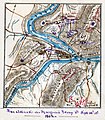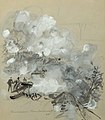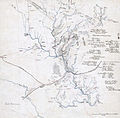Portal:American Civil War: Difference between revisions
rm Portal:War |
Reverted 1 edit by 2603:300C:1B0B:8400:A485:A932:7972:5093 (talk): That broke the formatting |
||
| (9 intermediate revisions by 8 users not shown) | |||
| Line 58: | Line 58: | ||
{{/box-header|Related portals|noedit=yes}} |
{{/box-header|Related portals|noedit=yes}} |
||
{{Related portals| |
{{Related portals|United States}} |
||
---- |
---- |
||
{{Related portals |
{{Related portals|Military history of Australia|Genocide}} |
||
{{Box-footer}} |
{{Box-footer}} |
||
Latest revision as of 06:23, 24 September 2024
 |
 |

The American Civil War (1861–1865) was a sectional rebellion against the United States of America by the Confederate States, formed of eleven southern states' governments which moved to secede from the Union after the 1860 election of Abraham Lincoln as President of the United States. The Union's victory was eventually achieved by leveraging advantages in population, manufacturing and logistics and through a strategic naval blockade denying the Confederacy access to the world's markets.
In many ways, the conflict's central issues – the enslavement of African Americans, the role of constitutional federal government, and the rights of states – are still not completely resolved. Not surprisingly, the Confederate army's surrender at Appomattox on April 9,1865 did little to change many Americans' attitudes toward the potential powers of central government. The passage of the Thirteenth, Fourteenth and Fifteenth amendments to the Constitution in the years immediately following the war did not change the racial prejudice prevalent among Americans of the day; and the process of Reconstruction did not heal the deeply personal wounds inflicted by four brutal years of war and more than 970,000 casualties – 3 percent of the population, including approximately 560,000 deaths. As a result, controversies affected by the war's unresolved social, political, economic and racial tensions continue to shape contemporary American thought. The causes of the war, the reasons for the outcome, and even the name of the war itself are subjects of much discussion even today. (Full article)
Colross (also historically known as Belle Air and Grasshopper Hall) is a Georgian style mansion built around 1800 as the center of a large plantation in what is now the Old Town neighborhood of Alexandria, Virginia, and moved circa 1930 to Princeton, New Jersey, where it is currently the administration building of Princeton Day School.
The Colross property originally occupied the entire 1100 block of Oronoco Street; Alexandria merchant John Potts developed it as a plantation and began building the mansion in 1799–1800. In 1803, Jonathan Swift—also an Alexandria merchant and a city councilman—purchased the property and during his ownership continued constructing the mansion. After Swift died in 1824, Colross was purchased by Thomson Francis Mason (1785–1838), son of Thomson Mason (1759–1820) and grandson of Founding Father George Mason (1725–1792) of Gunston Hall. Mason served as a judge of the Criminal Court of the District of Columbia and as mayor of Alexandria. Mason, who made Colross his chief homestead, modified and enlarged the mansion. After successive ownerships, the area around Colross became heavily industrialized. The mansion was bought by John Munn in 1929; between that year and 1932, it was transported brick-by-brick to Princeton, where in 1958 it was sold to Princeton Day School, which uses it as a school administration building housing its admission and advancement offices. (Full article...)

During the American Civil War (1861–1865), Maryland, a slave state, was one of the border states, straddling the South and North. Despite some popular support for the cause of the Confederate States of America, Maryland did not secede during the Civil War. Governor Thomas H. Hicks, despite his early sympathies for the South, helped prevent the state from seceding.
Because the state bordered the District of Columbia and the opposing factions within the state strongly desired to sway public opinion towards their respective causes, Maryland played an important role in the war. The Presidency of Abraham Lincoln (1861–1865) suspended the constitutional right of habeas corpus from Washington to Philadelphia. Lincoln ignored the ruling of Chief Justice Roger B. Taney in "Ex parte Merryman" decision in 1861 concerning freeing John Merryman, a prominent Southern sympathizer arrested by the military. (Full article...)
Benjamin Harrison (August 20, 1833 – March 13, 1901) was the 23rd president of the United States, serving from 1889 to 1893. He was a member of the Harrison family of Virginia—a grandson of the ninth president, William Henry Harrison, and a great-grandson of Benjamin Harrison V, a Founding Father. A Union Army veteran and a Republican, he defeated incumbent Grover Cleveland to win the presidency in 1888 and was defeated for a second term by Cleveland in 1892.
Harrison was born on a farm by the Ohio River and graduated from Miami University in Oxford, Ohio. After moving to Indianapolis, he established himself as a prominent local attorney, Presbyterian church leader, and politician in Indiana. During the American Civil War, he served in the Union Army as a colonel, and was confirmed by the U.S. Senate as a brevet brigadier general of volunteers in 1865. Harrison unsuccessfully ran for governor of Indiana in 1876. The Indiana General Assembly elected Harrison to a six-year term in the Senate, where he served from 1881 to 1887. (Full article...)
- ... that Benjamin Jackson was likely paid at least $300 to fight in the American Civil War as Lewis Saunders?
- ... that Carter Moore Braxton fought for the Confederacy throughout the American Civil War and, according to one report, had seven horses killed under him but avoided any wounds?
- ... that some historians believe that Steele's Greenville expedition marked a shift in the Union's war policy?
- ... that Emma Dean Powell received a pass from General Ulysses S. Grant to accompany her husband to battlefield camps during the American Civil War after he lost his arm?
- ... that in the aftermath of the American Civil War, the only Black-led organization providing teachers to formerly enslaved people was the African Civilization Society?
- ... that Charles Herman Allen, university administrator and American Civil War captain, opened the University of Wisconsin to female enrollment in 1863?
- Attention needed
- ...to referencing and citation • ...to coverage and accuracy • ...to structure • ...to grammar • ...to supporting materials
- Popular pages
- Full list
- Cleanup needed
- The West Tennessee Raids
- Requested articles
- James Ashby (soldier) • Benjamin D. Fearing • James B. Speers • Charles S. Steedman • Battle of Barton's Station • Lawrence P. Graham • Frederick S. Sturmbaugh • Davis Tillson • Action at Nineveh (currently a redirect) • International response to the American Civil War • Spain and the American Civil War • Savannah Campaign Confederate order of battle • Native Americans in the American Civil War (currently disambiguation after deletion) • Battle of Lafayette • Battle of Sunshine Church • Requested American Civil War Medal of Honor recipients
- Expansion needed
- Battle of Boonsborough • Battle of Guard Hill • Battle of Rice's Station • Battle of Simmon's Bluff • Battle of Summit Point • Charleston Arsenal • Edenton Bell Battery • First Battle of Dalton • Blackshear Prison • Edwin Forbes • Hiram B. Granbury • Henry Thomas Harrison • Louis Hébert (colonel) • Benjamin G. Humphreys • Maynard Carbine • Hezekiah G. Spruill • Smith carbine • Edward C. Walthall • Confederate States Secretary of the Navy • Confederate States Secretary of the Treasury • David Henry Williams • Battle of Rome Cross Roads • Delaware in the American Civil War • Ironclad Board • United States Military Railroad • Kansas in the American Civil War • Rufus Daggett • Ebenezer Magoffin • Confederate Quartermaster-General's Department • First Corps, Army of Northern Virginia • Francis Laurens Vinton • Henry Maury • Smith's Expedition to Tupelo • Other American Civil War battle stubs • Other American Civil War stubs
- Images needed
- Battle of Lone Jack • Preston Pond, Jr. • Melancthon Smith
- Merging needed
- 1st Regiment New York Mounted Rifles and 7th Regiment New York Volunteer Cavalry
- Citations needed
- 1st Alabama Cavalry Regiment (Union) • 4th Maine Battery • 33rd Ohio Infantry • 110th New York Volunteer Infantry • Battle of Hatcher's Run • Camp Dennison • Confederate colonies • CSS Resolute • Dakota War of 1862 • Florida in the American Civil War • Ethan A. Hitchcock (general) • Fort Harker (Alabama) • Gettysburg (1993 film) • Iowa in the American Civil War • Second Battle of Fort Sumter • Samuel Benton
- Translation needed
- Add an article here!
The following Wikimedia Foundation sister projects provide more on this subject:
-
Commons
Free media repository -
Wikibooks
Free textbooks and manuals -
Wikidata
Free knowledge base -
Wikinews
Free-content news -
Wikiquote
Collection of quotations -
Wikisource
Free-content library -
Wikiversity
Free learning tools -
Wikivoyage
Free travel guide -
Wiktionary
Dictionary and thesaurus
- Shortcuts to this page: Portal:ACW • P:ACW






































































